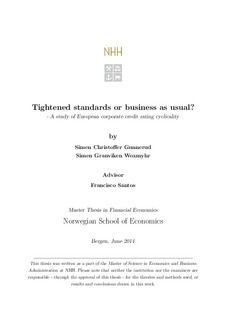Tightened standards or business as usual? : a study of European corporate credit rating cyclicality
Master thesis
Permanent lenke
http://hdl.handle.net/11250/222795Utgivelsesdato
2014Metadata
Vis full innførselSamlinger
- Master Thesis [4372]
Sammendrag
This paper examines which variables are statistically signi cant in a corporate credit
rating process, and if there has been a tightening in rating practice during and after
the nancial crisis hit Europe in 2008. We investigate whether we can argue that the
possible tightening of standards can be seen as a procyclical way of assessing credit
ratings. By procyclical ratings we refer to CRAs' tendency to excessive downgrade in
recession, leading to higher capital cost for the downgraded companies, thus leading to
even poorer results and an intensi ed recession.
Utilizing annual fundamental values from rms in the Eurozone and the UK from 2004-
2012 with a Moody's rating, we nd indications for such a tightening of standards, but
the evidence is not strong enough to draw any rigid conclusions. All our di erent models
over predict post-crisis ratings, with signi cant di erence of means. Further we nd a
general downgrading post-crisis of approximately 0.75, where a value of 1 equals one subrank
rating, adjusted for the e ects from corporate fundamental variables. Breaking it
down into cross-section analysis, we nd strong evidence that some industries and regions
may have experienced stricter standards than others.
Our analysis is based on two di erent methods; (1) building models based on pre-crisis
data using corporate nancials and macroeconomic variables to compare an out-of- sample
estimation with the actual post-crisis ratings, and (2) using propensity score matching
also using corporate nancials.
